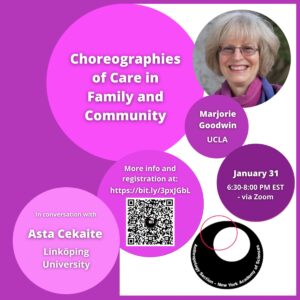NYAS Lecture 1/31: Choreographies of Care in Family and Community

General
On January 31st, 6:30 PM, Eastern Time, the New York Academy of Sciences will host, “Choreographies of Care in Family and Community”.
To register for this event click here.
Caring involves acting with affection and regard for another to enhance the well being of the party cared for. The ethics of care is based on receptivity, relatedness, and responsiveness. Within an American context, as a linguistic anthropologist, by making use of audio and video- recorded interaction, I examine the moment-to-moment practices through which care is instantiated in interactions within families, between doctor and patient, and between a dying patient and his students and colleagues. Routinely parents participate in forms of embodied care work using touch amidst a range of interactions including grooming, comforting, play, apology and salutations. Practices of greetings and farewells, overlaid with bodily inter-twinings, punctuate various parts of the family’s daily round — displaying forms of rich attunement.
We (Raia, Goodwin, and Deng) next consider how a doctor who practices Relational Medicine (Raia and Deng 2014) cares for and socializes his advanced heart care patient (later diagnosed with terminal cancer) in the process of “living towards death.” Through narrative exchange the doctor guides his patient in how to approach death with equanimity. Through email exchanges and informal speeches, the patient (a professor) becomes a “mentor on dying” for his students. A Mexican colleague’s story about how her comadre’s process of dying became a practical guide for choreographing the patient’s own death. The presence and vision of the now-deceased teacher continues in weekly Co-operative Action zoom labs where students and colleagues from five continents present their work for commentary.
Featured Speaker
Dr. Goodwin is a linguistic anthropologist concerned with the embodied language practices human beings use to construct in concert with each other the social, cultural and cognitive worlds they inhabit. Much of her work has focused on the organization of language and interaction in children’s peer groups, families, and workplace settings.
She investigates how children in boys’ and girls’ peer groups elaborate and dispute their notions about moral behavior, including inequality, as they play or work together. Her most recent work deals with how forms of human sociality, intimacy and familial integration, are achieved through a range of coordinated, mutually elaborating modalities, including language, touch, prosody, and structure in the environment.
Discussant
Asta Cekaite is a Professor in Child Studies, Thematic Research Unit, Linköping University, Sweden. Her research involves an interdisciplinary approach to language, culture, and social interaction. Specific foci include social perspectives on embodiment, touch, emotion, and moral socialization. Empirical fields cover adult-child and children’s peer group interactions in educational settings, and family in various cultural contexts (Sweden, USA, Japan, Finland).
She has published in Language in Society, Annual Review of Anthropology, Linguistics and Education, Text & Talk, etc. With M. H. Goodwin she has co-authored Embodied family choreography: Practices of control, care and mundane creativity (Routledge, 2018). She has co-edited (with L. Mondada) Touch in social interaction: Touch, language and body (Routledge, 2021); with Blum-Kulka, S., Gröver, V. & Teubal, E. Children’s peer talk: Learning from each other (Cambridge University Press, 2014). She has also co-edited special issues in journals: Cekaite, A. & Evaldsson, A-C. (2020). The moral character of emotion work in adult-child interactions. Text & Talk; Cekaite, A. & Burdelski, M. (Eds.) (2021). Pragmatics of crying in adult-child interactions. Journal of Pragmatics.